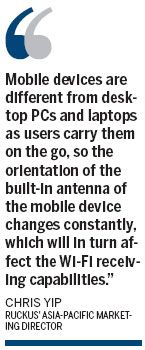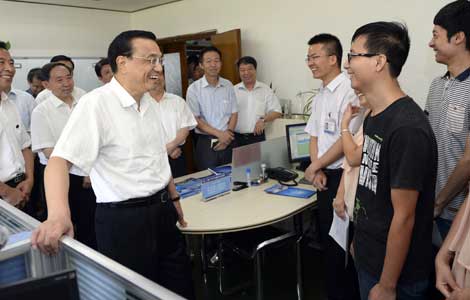Ruckus helps med school go Wi-Fi
Updated: 2013-08-19 10:47
By Michael Barris in New York (China Daily)
|
||||||||

A back-to-school treat awaits students, faculty and staff at a Sichuan province medical college this fall: strong, clear wireless Internet service from what is due to become the largest campus Wi-Fi network in China, installed by a California wireless technology company.
Ruckus Wireless Inc of Sunnyvale, California, has teamed up with China Telecom, the State-owned telecommunications giant, to complete phase one of the state-of-the-art system at Luzhou Medical College in western China.
Covering 550,000 square feet of classrooms and offices and 338,000 square feet of dormitory buildings on two major campuses, the network provides "reliable, high-performance Internet access" to more than 15,000 faculty and students, Ruckus said.
Liu Yuqing, the college's network center director, said the upgrade - which wasn't announced until a nine-month monitoring period confirmed its success - has ended the frequent dropped signals and unstable connections that had baffled the college's technicians.
"We did not receive any complaints. We're now free to focus on other important tasks, like educating our students," Yuqing said.
Chris Yip, Ruckus' Asia-Pacific marketing director, told China Daily the installation represents a triumph over the technical hurdles involved in delivering Internet service to thousands of faculty and students who are increasingly using smartphones, tablets and other mobile devices.
More than 1.2 billion people are now connected to the mobile web via smartphones or tablets, and China is the world's largest smartphone market with more than 400 million mobile Internet users, according to Analysys International.
Mobile devices "have become increasingly popular with students in the last two years, highlighting the growing bring-your-own device trend in educational institutions around the world", Ruckus said.
However, when a large number of mobile devices are operating simultaneously in the same area, traditional Wi-Fi systems struggle with a lack of capacity, causing users to suffer losses of signal, or "drop-outs".
Conventional systems "simply can't accommodate" the challenges posed by high user density, Yip said.
"Mobile devices are different from desktop PCs and laptops as users carry them on the go, so the orientation of the built-in antenna of the mobile device changes constantly, which will in turn affect the Wi-Fi receiving capabilities," he said.
"User density" at Luzhou has surged "two to three times" in recent years as mobile device use soars, Yip said. Connectivity problems are particularly acute in dormitories in China because eight to 10 students on average may share a unit - more than at a typical US college dormitory, he said.
And with a greater number of indoor areas on Chinese campuses than in the US, "there are more walls, windows and doors for Wi-Fi signals to penetrate to reach the mobile device," Yip said.
Luzhou Medical, which is based in Luzhou, Sichuan, worked with China Telecom to complete the project's first phase last September, mainly covering dorms, offices and teaching buildings. Owing to phase one's success, the college plans to initiate phase two, which would extend the system campus-wide, Ruckus said. When completed, the system will be the largest of its kind in China, the company said.
michaelbarris@chinadailyusa.com
(China Daily USA 08/19/2013 page2)

 Ride to fly on the top of mountains
Ride to fly on the top of mountains
 Nadal beats Isner to win first Cincinnati crown
Nadal beats Isner to win first Cincinnati crown
 Wild Africa: The new attraction to Chinese tourists
Wild Africa: The new attraction to Chinese tourists
 Azarenka beat Williams for Cincinnati title
Azarenka beat Williams for Cincinnati title
 500th eruption of Sakurajima Volcano in 2013
500th eruption of Sakurajima Volcano in 2013
 A cocktail that's a treat for the eyes
A cocktail that's a treat for the eyes
 Private sector to care for the elderly
Private sector to care for the elderly
 Be innovative, Li tells graduates
Be innovative, Li tells graduates
Most Viewed
Editor's Picks

|

|

|

|

|

|
Today's Top News
China defense chief in DC
Trading mishap reveals flaws
Senior care opens wide for investors
Iran signals willingness to resume nuclear talks
Baby formula sales to be shifted to pharmacies
CIA document release acknowledges Area 51
36 killed in Egypt's prison truck escape attempt
Onus on US to improve military ties
US Weekly

|

|







